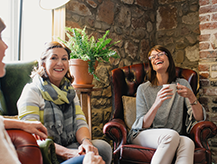Navigating relationships with cancer

How ovarian cancer can affect your relationship.
If you're reading this, you may be facing a cancer diagnosis in your relationship or struggling to support a partner through one. You might be overwhelmed, unsure how to move forward, or even questioning whether your relationship can survive the strain.
All of these feelings are normal, and you're not alone. This page will help guide you through the complexities of relationships when cancer becomes part of your life.
How cancer can impact your relationships
Cancer can affect every aspect of a relationship, from your emotions to your daily routines. Here's what you might encounter:
Emotions
A cancer diagnosis brings a whirlwind of emotions—fear, sadness, and even anger. Both partners may struggle with their feelings, and it's important to acknowledge these emotions without judgment.
Physical changes
Treatments like chemotherapy or surgery can cause significant physical changes, which may impact intimacy and how you view your partner. Understanding and discussing these changes is key to maintaining connection.
Finances
Medical bills, time off work, and unexpected expenses can put financial strain on relationships. Open communication about money can help alleviate some of this stress.
Time management
Cancer treatment often demands a lot of time, from medical appointments to recovery. This shift in routine can take away from time spent together and add to the stress of everyday life.
Guidance for partners when your partner has ovarian cancer
Supporting a partner with cancer can be difficult, and it may change the dynamics of your relationship. Here are some ways to cope:
Initial reactions and emotions
You may feel shocked, scared, or helpless when your partner is diagnosed. It’s important to express these emotions and talk to each other about how you’re feeling.
Dealing with changing roles as a caregiver
Becoming a caregiver can change your relationship dynamic. Balancing care with love and maintaining your bond is challenging but crucial.
Loneliness and isolation
Even with a partner, you might feel alone in your worries. It's okay to seek support from friends, family, or a therapist to share the emotional load.

Understanding your own feelings and needs is key.
Guidance for those with ovarian cancer
If you’re the one facing a cancer diagnosis, it can be difficult to communicate your needs to your partner. Here’s how to take care of your emotional health:
Understanding your feelings and needs
Recognising how you feel—whether it’s sadness, frustration, or fear—is the first step toward asking for the support you need.
Changes in emotional and physical intimacy
A cancer diagnosis can affect intimacy. It’s important to talk openly with your partner about how you’re feeling, both emotionally and physically. Learn more about intimacy after cancer here.
Managing stress and anxiety
Cancer can be overwhelming, but practicing stress-relief techniques, such as mindfulness or therapy, can help you cope and process the feelings you are experiencing.
Tips to support your relationship
- Communication is essential. Be honest about your feelings and encourage your partner to do the same.
- Balance caregiving and your relationship—try not to let cancer define your connection.
- Seek professional help if the strain becomes too much for either of you.

Navigating relationships with cancer
Facing a terminal diagnosis
If your partner’s cancer is terminal, it’s a difficult and emotional time. It’s important to spend time together, talk about your feelings, and plan for the future as best as you can. Support from family, friends, or a counselor can make this time more manageable.
Navigating changes in your relationship
Whether it’s moving forward together or making decisions about your future, cancer can bring many changes to your relationship.
Moving in together
A cancer diagnosis can push couples to consider living together for practical reasons. It’s important to weigh this decision carefully.
Marriage
Getting married is a personal choice. For some, a cancer diagnosis makes them want to strengthen their bond; for others, it may feel like too much pressure.
Having children
Cancer treatments can impact fertility. If children are part of your plan, talk to your healthcare provider about fertility preservation or adoption options.
Coping with loss
If you’ve lost a partner to cancer, grief can feel all-encompassing. Give yourself time to process, and seek support from loved ones or a grief counsellor to help you navigate your emotions.
You can find more resources on our support page.
Frequently asked questions
How can I best support my partner?
Supporting your partner through a cancer diagnosis involves patience, empathy, and open communication. It's important to listen without judgment and encourage your partner to express their feelings, fears, and concerns.
You can offer practical support by attending appointments, helping with daily tasks, and making time for moments of normalcy, such as watching a movie or sharing a meal.
Ask your partner what they need and how you can help, but also understand that their needs may change throughout their cancer journey.
Remember to look after your own mental and physical health too, as caregiving can be emotionally taxing.
What should I do if my partner is pushing me away?
If your partner is pushing you away, it can feel confusing and hurtful, but it's often a defence mechanism.
They may be feeling vulnerable, scared, or not wanting to burden you with their illness.
Gently remind them that you're there to support them and that you want to share this difficult time together.
It may help to suggest talking to a counsellor or joining a support group, either separately or together, to process these emotions.
Encourage communication, but also give them space if they need it—balancing care and respect for their boundaries is essential.
Can I end a relationship with someone who has cancer?
It's not uncommon to feel conflicted about staying in a relationship after your partner is diagnosed with cancer. Caring for someone with cancer can be overwhelming, and the emotional and physical changes may cause strain.
You may feel guilt or shame if you're considering ending the relationship, but it's crucial to be honest about your feelings.
If you’re feeling conflicted, talking to a therapist or a relationship counsellor may help you sort through your emotions and decide what’s best for both you and your partner.
Ending a relationship during such a vulnerable time is tough, but it's important to remember that you both deserve to be in a relationship that feels right and supportive.
Should I get married if I have cancer?
Deciding to marry when you or your partner has cancer is a deeply personal choice.
Some couples find that marriage strengthens their bond and gives them a sense of security, while others may feel that it's not the right time due to the emotional and financial strain of cancer treatment.
Consider having open conversations about your long-term goals, desires, and any concerns you may have.
If you both feel ready, marriage can be a powerful symbol of commitment in the face of adversity, but it’s important not to feel pressured.
What should I do if I feel lonely in my relationship?
Feeling lonely in your relationship, especially when dealing with cancer, is not uncommon.
The roles within the relationship may shift, with one partner becoming more of a caregiver, which can sometimes lead to feelings of isolation. It's important to communicate how you're feeling with your partner, even if it's difficult.
Finding additional support, whether from friends, family, or a therapist, can help ease those feelings of loneliness.
Remember, it's okay to seek out your own social connections and activities that bring you joy and give you a break from the pressures of caregiving or dealing with cancer.
How do I manage anxiety over cancer recurrence
The fear of cancer recurrence can be paralysing, both for the person who had cancer and their partner.
It’s important to address these fears by discussing them openly with your partner and seeking reassurance from healthcare providers. While the fear may never fully go away, focusing on the present and taking steps to stay informed about your partner’s health can help.
Mindfulness practices, therapy, and staying engaged in activities that bring joy can also reduce the constant worry about the future.
It’s normal to feel anxious, but with time and support, many couples find ways to live without letting the fear of recurrence dominate their lives.


